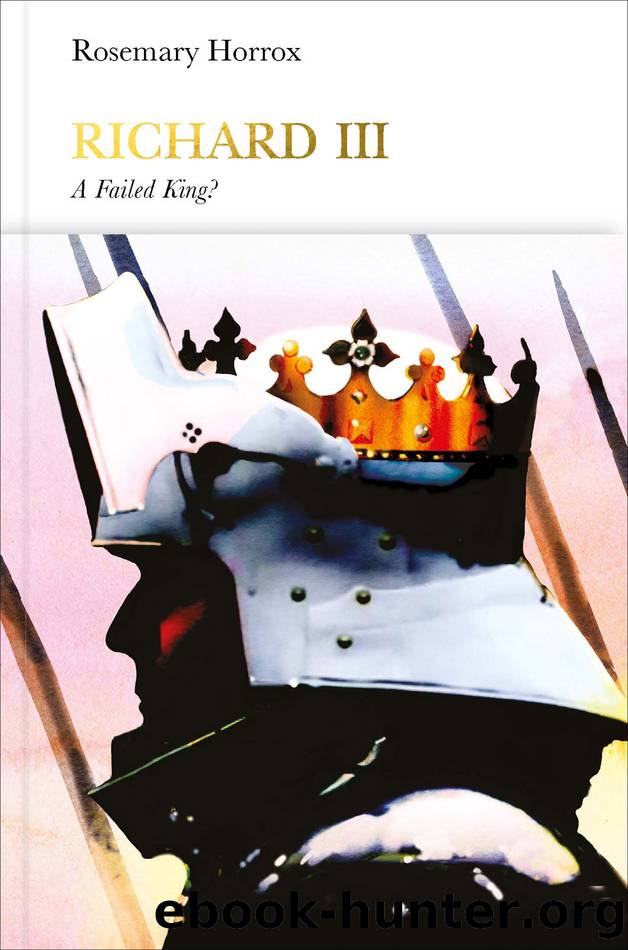Richard III by Rosemary Horrox

Author:Rosemary Horrox [Horrox, Rosemary]
Language: eng
Format: epub
Publisher: Penguin Books Ltd
Published: 2015-06-04T00:00:00+00:00
4
Picking Up the Pieces
The failure of Buckinghamâs rebellion brought Richard no security. There was now an acknowledged (and persuasive) rival for the crown in the shape of Henry Tudor, who was safely back in Brittany after his aborted attempt to land in the south-west. In Rennes Cathedral on Christmas morning 1483, he swore on the sacrament that, were he to take the throne, he would marry Edward IVâs daughter Elizabeth. This was the cue for his followers to kneel and formally do him homage as their king. If in the previous October Yorkist support for him had been faute de mieux, given his Lancastrian pedigree and lack of any real title to the throne, it would in future be much more enthusiastic and Richard knew it. For the moment, though, Richard had a breathing space. His own Christmas was given over to the celebration of his triumph â the Continuator rather sniffily âpasses overâ the extravagance of the occasion â and then came the meeting of parliament at Westminster on 23 January, postponed from 9 November. From the kingâs perspective it had two main items of business. One was the formal assertion of his title, in the shape of the petition presented to him in June (the titulus regius). The other was the condemnation of his opponents.
The main Act of Attainder lists ninety-eight men, the largest number ever attainted at one time. Even then it was far from a complete list of those implicated. A separate act dealt with the particular position of Margaret Beaufort, who escaped attainder for the sake of her husband Lord Stanleyâs âgood and faithful serviceâ, but was stripped of her own titles, property and income. The three bishops involved in the rebellion (Piers Courtenay of Exeter had joined Lionel Woodville and John Morton in opposition) also needed separate attention. Although, as their Act of Attainder stated, they deserved to lose their life, land and goods, because the king âprefers mercy and pity to rigourâ, they were stripped only of all their temporal and feudal possessions.1 Impressive as the length of the list is, it is far from a complete tally of those known to have been involved. A handful of those implicated managed to buy themselves off during the life of the parliament with grants of land to the king or his allies. William Knyvet, who had been Buckinghamâs companion at Brecon, later claimed to have paid 700 marks to the king, 100 marks to the queen and handed over four of his manors to the king and other land to Sir James Tyrell, a man of known influence about the king.2 The names of numerous others who escaped attainder â but who none the less suffered forfeiture â can be found in the commissions of the previous autumn to try the rebels and to seize their land. Richard Edgecombeâs land in the south-west had been seized by Edward Redmane, who also took the cattle and sheep of a lesser, and otherwise unknown, Cornish rebel, John Bartelet.
Download
This site does not store any files on its server. We only index and link to content provided by other sites. Please contact the content providers to delete copyright contents if any and email us, we'll remove relevant links or contents immediately.
Blood and Oil by Bradley Hope(1561)
Wandering in Strange Lands by Morgan Jerkins(1420)
Ambition and Desire: The Dangerous Life of Josephine Bonaparte by Kate Williams(1389)
Daniel Holmes: A Memoir From Malta's Prison: From a cage, on a rock, in a puddle... by Daniel Holmes(1334)
Twelve Caesars by Mary Beard(1315)
It Was All a Lie by Stuart Stevens;(1296)
The First Conspiracy by Brad Meltzer & Josh Mensch(1168)
What Really Happened: The Death of Hitler by Robert J. Hutchinson(1163)
London in the Twentieth Century by Jerry White(1147)
The Japanese by Christopher Harding(1133)
Time of the Magicians by Wolfram Eilenberger(1126)
Twilight of the Gods by Ian W. Toll(1119)
Cleopatra by Alberto Angela(1094)
A Woman by Sibilla Aleramo(1092)
Lenin: A Biography by Robert Service(1076)
John (Penguin Monarchs) by Nicholas Vincent(1068)
Reading for Life by Philip Davis(1024)
The Devil You Know by Charles M. Blow(1024)
The Life of William Faulkner by Carl Rollyson(984)
